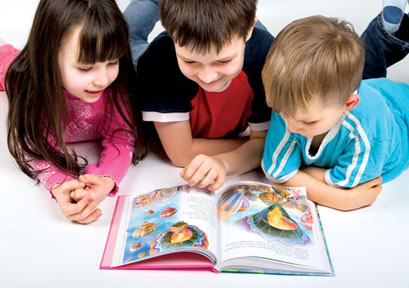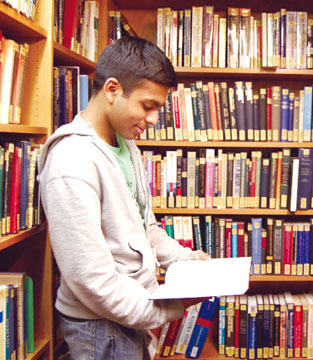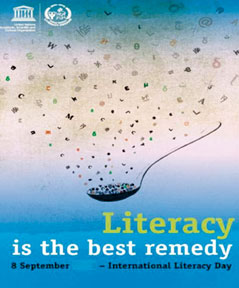|
 World Literacy Day on Wednesday: World Literacy Day on Wednesday:
For a better and informed world
By Ranga CHANDRATHNE
September 8 has been declared World Literacy Day by the UNESCO.
Despite the continuous stress on education, it has been found that, one
in five adults is not literate. Two-third of the illiterate are women
while 72 million children have not received any education in school.
Although UNESCO has been campaigning to keep literacy on top of
national and international agendas, "literacy for all" still remains an
elusive target with some 759 million adults lacking minimum literacy
skills. Against this backdrop, it is important to look briefly at the
short history of World Literacy Day and the recognition of literacy as a
vital component of human development.
History of Intíl Literacy Day
UNECSO adopted the World Literacy Day in 1965 and has observed it
since September 8 annually, focusing on diverse aspects of literacy
programs and how they are directly linked to overall human development.
The UN declared 1990 as International Literacy Year and marked the
ongoing commitment of the world community to boost literacy as a key to
personal progress and for socio-economic development of nations.
Last year's theme of the World Literacy Day was, 'The Power of
Literacy' while the theme for 2009 -2010 is 'Literacy and Empowerment'.
This year's focus will be on the need for empowerment of literacy and
its importance for participation, social progress and citizenship. The
proposal for a United Nations Literacy Decade has also been accepted.
The definition of literacy which is not confined to the mere ability
of a person to read and write is a much broader concept. A literate
person could not only read and write a short statement relevant to
everyday life, but is also capable of analytical understanding. At a
different level, literacy is a means of personal liberation and
development through formal and informal education.
 Literacy is also a method of achieving economic progress and the
general well-being of mankind, inculcating values of national
integration, conservation of surroundings, gender equality, and
observance of standard family traditions. Literacy is also a method of achieving economic progress and the
general well-being of mankind, inculcating values of national
integration, conservation of surroundings, gender equality, and
observance of standard family traditions.
Governments and literacy programs
Recognising the importance of literacy, governments the world over
have announced four initiatives to be pursued in collaboration with
several UN agencies. The four initiatives comprise Education for all,
Millennium Development Goals, United Nations Literacy Decade and United
Nations Decade of Education for Constant Development.
It is time to examine how global citizens could benefit from this
annual event throughout the year rather than confining it to a single
day on the calendar. To maintain a high literacy rate in any society, it
is imperative that reading should be encouraged at all levels. The mere
ability to read and write and fill up a utility form should not be
considered a fact to be proud of.
If one wants to reap the benefits of literacy, one should engage
oneself deep in language and literacy exercises.
In countries such as Australia, special programs have been designed
to promote workplace language and literacy. The Australian government
has initiated programs to assist workplace training where language,
literacy or numeracy support is required. Through such programs,
enterprises can access government funding for the delivery of accredited
training.
Benefiting from the global event
It is a well-known fact that when there were no televisions,
computers, teledramas, and FM channels, reading was a primary leisure
activity. People would spend hours reading books while travelling to
lands far away. The tragedy is that, with time, and infatuation with the
entertainment media, people have lost their skills and passion to read.
The reading habit should be encouraged from primary schools upto the
university. What is important is not just to read trash, but to read and
appreciate good literature. The very first step towards realising such a
lofty ideal is to buy and read a book.
In addition to reading newspapers, magazines, to keep abreast of the
happenings around the world, books would leave deep impressions in the
readerís mind. They undoubtedly, provide information and expand the
knowledge while enriching one's life.
 Teachers and parents always encourage children to read books, with
the aim of improving language and presentation skills. Another important
factor is to up hold and continue the oral tradition of storytelling. In
a world controlled by technology, one may be cynical about the idea of
reviving the oral tradition in a highly competitive and globalised
milieu. Improved language, and interpersonal and presentation skills are
vital to progress. In advanced countries such as Singapore, there are
national programs focusing on even digital story-telling initiated by
the National Book Development Council. Teachers and parents always encourage children to read books, with
the aim of improving language and presentation skills. Another important
factor is to up hold and continue the oral tradition of storytelling. In
a world controlled by technology, one may be cynical about the idea of
reviving the oral tradition in a highly competitive and globalised
milieu. Improved language, and interpersonal and presentation skills are
vital to progress. In advanced countries such as Singapore, there are
national programs focusing on even digital story-telling initiated by
the National Book Development Council.
Parents should tell a bedtime story that they have learnt from their
grandparents as a means to encourage their children to read books.
Story-telling will not only impart the much - needed language and
presentation skills in an innovative manner in the formative minds of
the children, but it will also act as a vehicle to inculcate good habits
and sowing the ideas of national integration in them, particularly in a
multi-ethnic and multi-lingual society.
Appreciating literature is the first step towards building an
informed society with higher literacy rate. Reading classical literature
irrespective of whether they are in Sinhala, Tamil or English will
tremendously improve one's language skills and literacy.
Another step towards improving one's language skills is to encourage
learning a language other than one's mother tongue. It will broaden
one's worldview, enhancing language and presentation skills.
It is only through such meaningful efforts that we could reap maximum
benefits from the World Literacy Day.
|

